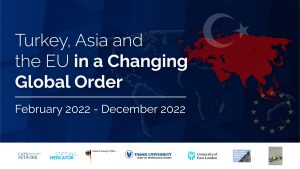Turkey, Asia and the EU in a Changing Global Order
Please click here for the project’s page on the website of CATS.
Recent scholarship argues that Turkey’s increased interest in establishing relations with Asian powers over the last twenty years is the result of a structural shift in global power from the United States to Asia, especially China and Southeast Asia. As the economic powers of the transatlantic economies – especially the Anglo-American economies – are in a protracted yet continuous decline, Turkey has sought to diversify its economic partners. The more China’s economic dynamism increases, the more it creates conditions for contributing to, and even determining, the macroeconomic indicators of Asia as a whole – including Turkey’s. China’s new Belt and Road Initiative also adds new dynamics – and heated debates – to the Mediterranean. Various commentators across the world are also noting the withdrawal of the US from the Middle East and North Africa and attributing it to the country’s relative economic decline over the last few decades. Turkey has meanwhile been undertaking significant political transformations domestically, such as a shift from a parliamentary to a presidential system. The country’s growing economic ties to Asia, and especially to China, is particularly significant in the context of this changing domestic political landscape because these changes have a higher potential to influence Turkey’s future development and its political and economic trajectory. New dynamics in economic and political relations between Turkey and Asia are certainly leaving their imprint on Turkey-EU relations as well. This project thus proposes to examine Turkey’s domestic changes and foreign policy alterations in globally dynamic circumstances and its impacts on Turkey-Asia relations as well as the policy implications of these processes for Turkey-EU relations.
The Centre for Applied Turkey Studies (CATS) at Stiftung Wissenschaft und Politik (SWP) in Berlin is funded by Stiftung Mercator and the Federal Foreign Office. CATS is the curator of CATS Network, an international network of think tanks and research institutions working on Turkey. “Turkey, Asia, and the EU in a Changing Global Order” is a CATS Network project.
Project Duration: Feb 22 – Dec 22
Collaborating Institutions
Yaşar University Center for Mediterranean Studies
Project Team:
Outputs
Yaşar University Center for Mediterranean Studies Policy Paper I
Yaşar University Center for Mediterranean Studies Policy Paper II
Yaşar University Center for Mediterranean Studies Policy Paper III

